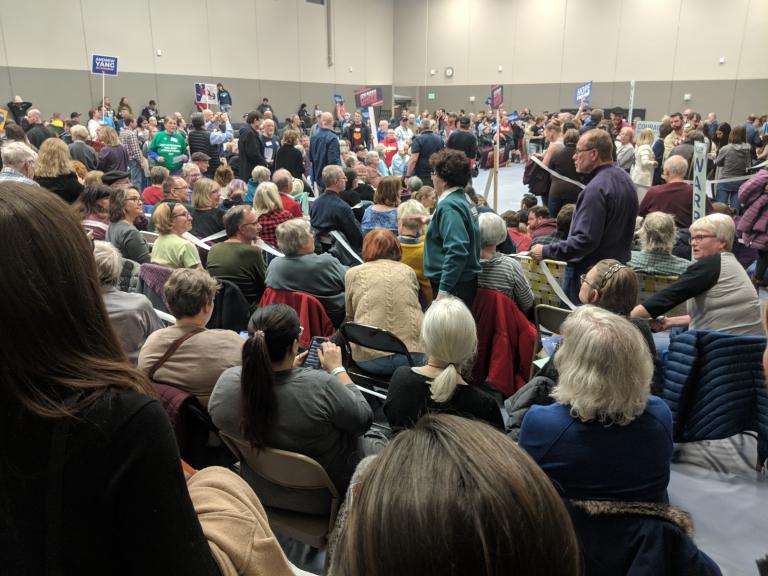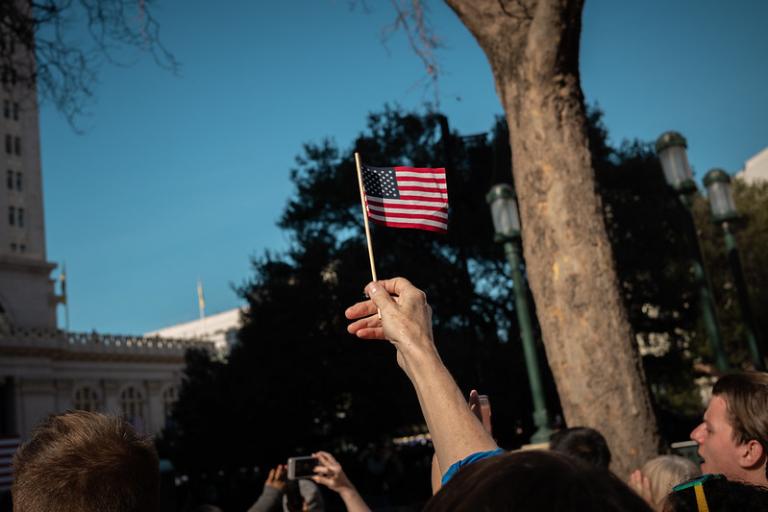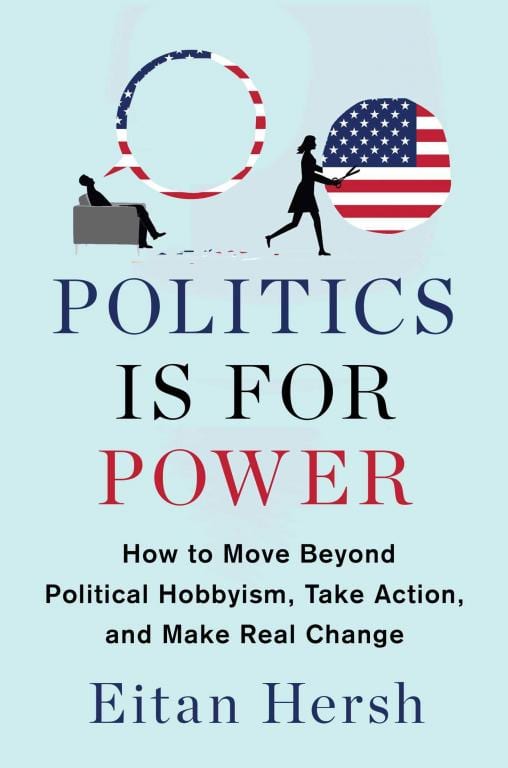
I must begin this post with a confession. The first thing I often do when I wake up is read the politics section of the New York Times. I should begin each morning by smiling gratefully at the dawn sky and thanking the heavens for another blessed day to live. Instead, I’m usually hidden under my down comforter, the only light in the room emanating from my smartphone screen, which I anxiously scroll to find new election forecasts and political commentary, most of which has already been said before.
In general, I have a lot of bad technology habits, but they become even worse when they intersect with my bad political news habits. I recall waking up the morning after the Iowa caucuses feeling tired and almost hungover—not from the overconsumption of alcohol, but from the overconsumption of political news. I imagine others, dealing with the aftermath of Super Tuesday, might be feeling similarly this week.
I’ve always been interested in politics. I am, after all, a political historian in addition to being a religion scholar and an immigration scholar. It’s my professional responsibility to stay informed and bring my expertise to inform public debate. But my excessive consumption of news has become almost pathological in the past few years, especially in the past few months, with the ongoing political drama of both impeachment and the 2020 election.
And so, for Lent, the solemn season of reflection and repentance, I have vowed to give up political hobbyism. I’m striving instead to trade shallow political engagement for deep political engagement, which focuses on building relationships, serving my community, and effecting real change that has an impact on my neighbors. I know from my research on religious communities and their involvement in immigration and refugee issues that this type of work matters immensely—not simply for meeting the real, immediate needs of people, but for creating enduring and impactful political change.
The problem, I’m finding, is that political hobbyism is hard to give up. Like chocolate and red meat and single-use plastic, it’s pervasive, it’s convenient, and it often feels good—until we wake up the next morning.
“Obsessive News-Following and Online ‘Slacktivism’”
Political hobbyism is the topic of Politics is for Power, a new book by Tufts political scientist Eitan Hersh. Hersh describes political hobbyism as “consuming and participating in politics by obsessive news-following and online ‘slacktivism,’ by feeling the need to offer a hot take for each daily political flare-up, by emoting and arguing and debating, almost all of this from behind screens or with earphones on.” The people who practice politically hobbyism are typically people who consider themselves “politically engaged,” and they’re often in Hersh’s own demographic group—white, male, and college-educated.
Political hobbyists often harbor genuine concern about the direction of the country. However, their primary form of engagement—constantly refreshing FiveThirtyEight.com, for example, and engaging in Twitter feuds—is only a shallow form of political activity. In Hersh’s view, it’s actually a form of entertainment. Focused primarily on meeting short-term individual desires, these pastimes make people feel good, even if they don’t produce meaningful, long-term political change. “[I]t would be hard to describe our behavior as seeking to influence our communities or country,” Hersh writes. “Most of us are engaging to satisfy our own emotional needs and intellectual curiosities.”
Political hobbyism is harmful for a variety of reasons, Hersh argues. For one, it contributes to the breakdown of our political system. “Our collective treatment of politics as if it were a sport affects how politicians behave,” he writes. “They increasingly believe they benefit from feeding the red meat of outrage to their respective bases, constantly grandstanding for the chance that a video of themselves will go viral. In treating politics like a hobby, we have demanded they act that way.”
In addition, the individual pastime of political hobbyism undermines the community-focused work of real politics. “[H]obbyism takes us away from spending time working with others to acquire power,” Hersh writes. “While we sit at home, people who seek political control are out winning over voters.” He offers one memorable and deeply troubling example of this phenomenon:
In 2018, for instance, the Ku Klux Klan in North Carolina went around offering to help opioid addicts, telling addicts that their addiction wasn’t their fault and that the white knights of the KKK were there to offer a helping hand. This image haunts me not just because in it I see an organization I fear that is serious about power, that recognizes how service to one person at a time aggregates into power. The image haunts me juxtaposed to how most of the rest of us are doing politics.
“Politically Spiritual, but Not Religious”
Hersh likens the shallow political engagement of political hobbyists to the shallow religious engagement of people who are “spiritual but not religious,” a growing group in the United States. In his view, what political hobbyists have in common with people who are “spiritual but not religious” is a focus on meeting individual needs, rather than community needs. Hersh writes,
Spiritual-but-not-religious identifiers seek out religious-themed activities but reject communal or institutional religious settings. They typically engage in one-off events, solitary activities, or the anonymity of being another mat in a darkened yoga studio. These activities do not typically involve long-term commitments to other people…Spiritual-but-not-religious participation is finding opportunities to briefly help others and then move on (a onetime volunteer shift at a food pantry) or seeking personal gratification absent any sense of duty to serve others (as in the Jewish-ish podcast). Some of these are genuine attempts at moral self-improvement, but they share a common feature with shallow online political behavior, which is a focus on the self rather than a commitment to others.
In drawing parallels between the limitations of practicing political hobbyism and the limitations of being “spiritual but not religious,” Hersh quotes the critique of the Reverend Lillian Daniel, senior pastor at the First Congregational Church in Dubuque, Iowa. Daniel sees recent religious developments as reflecting “the norm for self-centered American culture.” As she says,
Any idiot can find God alone in the sunset. It takes a certain maturity to find God in the person sitting next to you who not only voted for the wrong political party but has a baby who is crying while you’re trying to listen to the sermon. Community is where the religious rubber meets the road. People challenge us, ask hard questions, disagree, need things from us, require our forgiveness. It’s where we get to practice all the things we preach.
In other words, the key difference between the self-oriented “spiritual but not religious” behaviors and the type of religious life that Daniel values is a long-term commitment to prioritizing relationships and serving others.
Setting aside my own quibbles with Hersh’s casual treatment of the term “spiritual but not religious”—a label that fails to account for groups that don’t fit the Protestant-centric rubric of being religious, a point that I’ve made in previous posts—I think that he makes a valuable point. Political hobbyism, while entertaining, is “an un-thought-through, cathartic, politically-spiritual-but-not-committed stab in the dark at fulfilling a civic duty.” Just as pursuing religion for deep-seated reasons and in the context of community is more sustainable and powerful, pursuing politics for deep-seated reasons and in the context of community is more sustainable and powerful.
“Politics and Service Are Not Different Things”
Importantly, religion is not merely a metaphor for Hersh. Religious groups also offer a useful example of the impactful merging of direct service, political action, and long-term commitment to community needs. As he rightly points out, immigrants and minorities have practiced this type of politics for a long time, especially through their religious institutions. Black churches, for example, have often functioned as institutions that provide social services at the same time that they support political organization. Similarly, Alyshia Galvez’s work has shown that Catholic parishes and devotional groups are important settings for Mexican Americans to find spiritual reassurance and material resources for daily survival and also advocate for immigration justice. “Group empowerment is the connection between service and politics,” Hersh writes. “In communities with real needs, where stakes are high, where fears are palpable, politics and service are not different things.” And throughout history, religious institutions have been a significant site for this type of group empowerment.
Hersh urges Americans to turn away from the paralyzing overconsumption of news and social media and shift attention to finding practical ways to address the needs of the people around them. This focus on serving others and using power to improve their communities would be “the redemption of politics.”
What he advocates bears much in common with what I’ve observed in my own research on the history of church-based refugee resettlement activists after the Vietnam War. Like many of us today, these activists were overwhelmed by the events of their time. However, they channeled their sadness about world events and their frustration with their government into meaningful direct service and community organizing projects that had long-term political importance.
I think, for example, of a Minnesota woman named Joanne, an opponent of the Vietnam War who turned her anger at the U.S. government into two decades of work leading grassroots Lutheran efforts to resettle refugees. “I was horrified at the Vietnam War and the effect that that had on that country,” she told me during an oral history interview. “And so getting involved with the refugee program here [at church] was one little thing that I could do, since my letters to the President or Congress hadn’t done too much.”
And I think of another Minnesota woman, Kathy, who was recovering from surgery when Saigon fell in 1975. Confined to bed, she was transfixed by the events she saw unfold on the television in her hospital room. She was especially moved by news coverage of refugees scrambling aboard helicopters evacuating people from Vietnam. But rather than becoming paralyzed by the news, she decided to take action as soon as she was released from the hospital. Within months, she was coordinating a massive volunteer effort involving three different congregations and organizing the effort to resettle the Twin Cities’ first Hmong refugee family. The wintry morning they arrived was less than a year after Kathy watched the television news from her hospital bed.
Years later, Kathy continued her community activism and eventually became a member of the Minnesota state legislature. And the Hmong family resettled by Kathy’s church was the first of thousands of Hmong refugees who eventually came to the Twin Cities, which is now home to a thriving Hmong American community. Hmong Americans themselves are now a formidable political force in Minnesota, and they have often advocated for just and generous immigration and refugee policies.
Kathy’s decision to respond to a distressing news event by organizing a community effort to serve people is an example of deep political engagement. She could have behaved like a political hobbyist: by shaking her fist at the television screen and complaining about political leaders among her friends. But she chose not to, and her own life and the community around her experienced significant social and political transformations as a result. That is real politics.

I began this essay with a confession, and so I’ll end it with another one: I’ve been terrible at abstaining from political hobbyism during Lent. I found Super Tuesday and the surrounding political spectacle utterly irresistible, not unlike a jumbo-sized bag of Cheetos. No surprise, I felt awful about overconsuming political news and social media commentary on Tuesday night. Devouring so many hot takes left me as miserable as devouring too many Flamin’ Hots.
But now is an even more important time for me to return to Hersh’s suggestions, which offer particularly valuable lessons for those who feel disappointed by some of the developments in the past few days. Meaningful political engagement isn’t about cheering for one candidate, or bashing another candidate, or besting another person halfway across the country in a Facebook debate about electability. Real politics is about cultivating relationships with the people around you and doing the real work to meet their needs.
And so, if you’re like many Americans who might feel discouraged and paralyzed by the news, here’s a hopeful place to begin. Take a break from nervously refreshing the Washington Post and engaging in Twitter battles. Instead, read your local newspaper and learn about the issues that are affecting your public transit system, your neighborhood public schools, or your public library system. Get involved with the organizations that address the needs of people who are struggling with domestic violence, housing and food insecurity, and ICE raids. There’s so much important work to be done, and we don’t have time to engage in politics simply as a hobby. We can begin, today, by taking time to know our neighbors, serve them, and love them.














